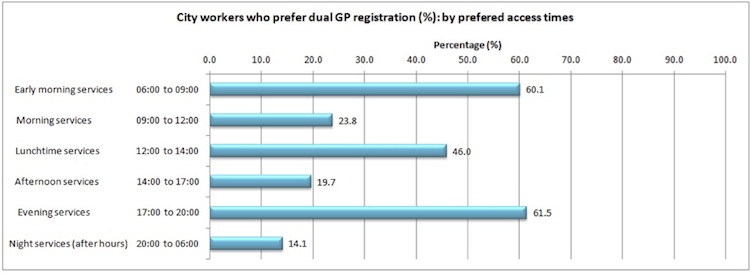![]()
Objective
The City of London Corporation appointed PHAST to undertake research into the current and future public health and primary healthcare needs of City of London (City) workers.
The primary objectives were to analyse existing datasets, engage key stakeholders and a sample of the City commuting worker population, in order to inform commissioners for future strategies to;
- Improve the health and wellbeing of the City worker population.
- Support City workers in accessing health services.
- Support employers by improving productivity.
Background
The background to this research lies in the context of the changes resulting from the Health and Social Care Act 2012, and the following two assumptions;
- The widely held perception that working in the City leads to significant amounts of stress related illness;
- The principle that NHS funding for key health services are generally based on where individuals live, rather than where they work.
The first of the aforementioned points suggests that there could be significant unmet health needs among the working population. The implication of the second is that there may be limited funding and services provided in the City itself to the working day population of over 300,000 as there are far fewer; in fact less than 12,000, residents.
The research is based on a combination of qualitative and quantitative methods, including interviews and a street-based survey of City workers. Areas of healthcare considered in the report include; the ability to register with General Practitioners (GPs) close to one’s place of work, a future option of dual registration (GPs close to work and home), and the provision of other, specialist services including counselling.
Results
Need: The research findings suggest that there is a particular need amongst City workers for support with stress, anxiety and depression. The sub-set of City workers currently showing the greatest health needs are those who are both suffering from high levels of stress and who smoke (just over 3% of total). City workers who drink more than twice the recommended levels of alcohol on a single occasion (binge drinkers) are generally currently in good health, however the health needs associated
with this behaviour are likely to manifest later in life, when many of them will no longer be working within the City of London. Enhanced prevention services targeting binge drinking in the City of London is therefore likely to have long-term financial benefits to the NHS.

Demand: The research results indicate a strong demand amongst City workers for more NHS GP services and potentially the reopening of an NHS walk-in centre in the City of London. Dual GP registration, with practices near both work and home, was welcomed in principle, though many practical barriers are noted. There is a high demand for access to health services and clinics during early mornings, lunchtimes and evenings, as demonstrated in the snap-shot results figure above. Pharmacies are identified to be able to play a more significant role to future services. Any new services would need to be well signposted, geographically flexible, located close to major transport hubs, and have short waiting times or robust appointment systems.
The full report is available here


